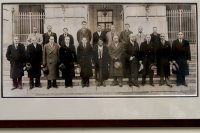
Phi Beta Kappa lecture explores evolutionary model for human morality
Economist Herbert Gintis offers the lecture The Evolution of Morality, describing morality as a result of a dynamic cultural and genetic interplay, at Bates College at 7 p.m. Monday, Oct. 4, in the Keck Classroom (G52), Pettengill Hall, 4 Andrews Road (Alumni Walk).
The event is open to the public at no charge. It’s sponsored by the Phi Beta Kappa Visiting Scholar Program, which makes available each year a dozen or so distinguished scholars who visit colleges and universities that have chapters of Phi Beta Kappa.
For more information about the lecture, please call 207-786-6146.
In The Evolution of Morality, Gintis will challenge the classical understanding of morality, as presented by philosophers such as Thomas Hobbes and John Locke, as a product of civil society. Instead, he will posit morality as the product of an evolutionary dynamic involving genes and culture.
In this model, culture is transformed by humans, and the new culture encourages new adaptive behaviors — making genes the product of culture just as culture is the product of genes. So morality is attributed to a set of evolved predispositions such as altruistic cooperation and punishment; the valuing of character virtues like honesty, loyalty, considerateness, cleanliness and courage; sensitivity to the judgment of others; and empathy.
Gintis is an external professor at the Santa Fe Institute and a professor of economics at Central European University in Budapest, where he heads a multidisciplinary research project, The Social and Mental Dynamics of Cooperation, funded by the European Science Foundation.
He is the author of books including Game Theory Evolving (Princeton University Press, 2000) and The Bounds of Reason (Princeton University Press, 2009). He regularly reviews material for prominent academic publications such as Science, Nature and Proceedings of the National Academy of Sciences, and is an editor of the Journal of Economic Behavior and Organization and of Games.
He received his doctorate in economics from Harvard University. His areas of expertise include altruism, cooperation, gene-culture co-evolution, human capital theory, and behavioral, evolutionary and epistemic game theory.
Phi Beta Kappa Visiting Scholars spend two days on each campus, meeting informally with students and faculty, taking part in classroom discussions, and giving a public lecture open to the entire academic community. The program aims to contribute to the intellectual life of the institution by making possible an exchange of ideas between the Visiting Scholars and the resident faculty and students.
Now entering its 55th year, the program has sent 577 scholars to colleges and universities across the country.




